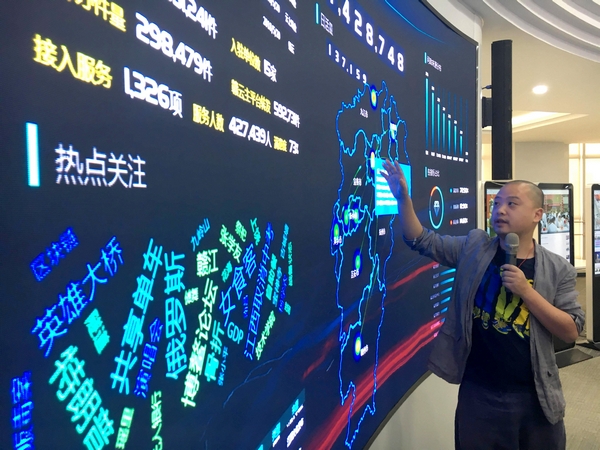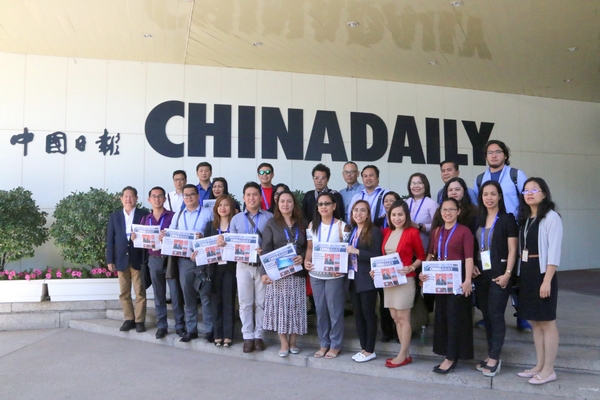
A staff member of Jiangxi Broadcasting and TV Station discusses the use of big data technology in Nanchang, Jiangxi Province during a 14-day tour seminar by Philippine media representatives in the People’s Republic of China last May.
(Conclusion)
Wei Xiao Hui, editor-in-chief of China.org.cn, a web portal, observed that circulation has been dropping fast as interest in online media rises.
Wei also observed an increase in the price of paper, along with reductions in the number of subscribers and the volume of advertisers for the past 3 years.
“A lot of people predict it (newspapers) will die in the future,” Wei said.
But for many Chinese experts like Deng Yushan, international correspondent of Xinhua News Agency, the continued growth of new media which draws a larger audience, especially from the younger age groups, does not spell the end of newspaper publications.
For Deng, making content as the “king” and innovation as the “key” will help expand print readership despite the presence of social media.
Wei Jia, English Editor of the Social Media Department, of China.org.cn for his part said, “Traditional print media sets a high standard, and it still draws an audience. It is not exactly threatened.”
Zhang Yan-Qiu, Director of the African Communication Research Center and a journalism and communication professor of Communication University of China (CUC), calls the current media trend as “screen communication”.
Zhang noted that most Chinese people tap their mobile screens to access information and news, and to communicate and transact with others.
Challenges
The advent of high mobile use in China poses a challenge in educating media communication students and even those who deliver the news.
To meet the demands of the industry, communication schools in China have to update textbooks and classroom content.
Communication schools also report an increase in enrollment which, for the past decade, has reached around 40,000 undergraduate students and 9,000 graduate communication students from 360 colleges and universities.
In CUC alone, there are around 10,000 undergraduate and 5,000 graduate communication students.

CDN photo/ King Anthony Perez
“Because of the new media, a (print) journalist may be required to report on the radio, appear on the screen and post the information they have gathered,” said CUC’s Zhang Yan-Qiu.
Social media impact
Zhang, who was one of the main speakers of a tour-seminar in China attended by 22 media delegates from the Philippines stressed the impact of social media in the modern Chinese society especially in making government officials accountable for their actions.
Corruption stories involving officials and reports on the lavish lifestyles of some Party members are concerns that had been freely communicated to the public, in the context of the stringent anti-corruption movement of the Communist Party of China (CPC).
Zhang observed that because of social media, Chinese government officials are more careful now.
“It gave pressure to the government. Now, we have social media. Everyone is free to speak,” noted Zhang; while Chinese punitive laws make citizens responsible for what they post online.
Guan explained that when using mobile applications, Chinese citizens are required to register by using real information such as those reflected in their official identification cards.
The same information is required for buying mobile phones.
Once a mobile user becomes subject of a complaint, administrators of social media platforms may censor the account for a period of time.
“Your account name can be unreal but the information you use in the account shall be verified,” Guan explained.
Zhang told the delegates that spreading false information and rumors is also punishable by law.
“Freedom of speech means you have to be responsible,” she added.
Meanwhile, Wei raised several concerns that need government action such as the proliferation of fake news and illegal dealings online.
“You have to support the internet industry to make it grow. But you have to make it a safer place,” Wei said.
Trumpeting the party line
Zhang admitted that internet content censorship such as filtering controversial events in China was still in force.
For instance, the government dispersal of Tiananmen Square protestors in 1989, which reportedly claimed thousands of young lives, could not be searched in Chinese search engines like Baidu.
“The media is the mouth of the party. You can say that is propaganda, but media helps promote in publicizing its policies,” Zhang said.
Deng explained to delegates that being state-run, every news organization in China is led by the Communist Party.
“Our mission is to serve the people, to communicate the message of our party to the world,” Deng said.
In a government with communist roots, Zhang said that journalism will always be politically related.
While human rights advocates may question the way government runs the media, Zhang believed that citizens have to make little sacrifices as China continues to develop into a stronger nation.
“Human rights mean you have money to spend, clean air and water to breathe. If you can vote, but you cannot afford to send your children to study and to have clean water, that’s not human rights,” Zhang told delegates.
Shifting from the western lenses
Collectively, Chinese media experts believe that the views of the Western world, particularly the United States, dominate media across the world.
Li Hengtian, Deputy Director of CIPG Training Center, lamented that the voice of Asian nations was relatively weaker than Western countries.
“Chinese media wants to focus on China’s win-win cooperation in helping developing countries such as having a mutually beneficial cooperation, seeking harmony with nations. We also do not impose our values on other countries contrary to Western countries,” Li said.
Deng Yushan of Xinhua News Agency, set a clear distinction between Chinese and Western media in terms of reportage.
While Chinese media organizations, generally run by the State, echo positive developments in society,
“Western news agencies tend to focus on the negative side,” Deng said.
University professor Zhang explained that Chinese media organizations promote constructive journalism, which is described as solution-focused reporting and not just reporting the problem.
Aside from focusing on the daily lives of ordinary Chinese people in the media reportage, Li shared that the realities in China can be shown to the international community by reporting on the efforts of the Chinese government to alleviate poverty.
“If you go to Beijing or Shanghai, you’ll think China is a developed country. But if you go to other areas, you’ll know that it is still a developing country,” Deng explained.
The widening gap between the rich and poor has been observed as the world’s most populous country continues to experience rapid growth.
Disclaimer: The comments uploaded on this site do not necessarily represent or reflect the views of management and owner of Cebudailynews. We reserve the right to exclude comments that we deem to be inconsistent with our editorial standards.
